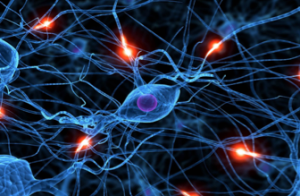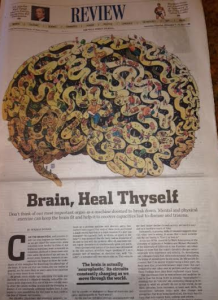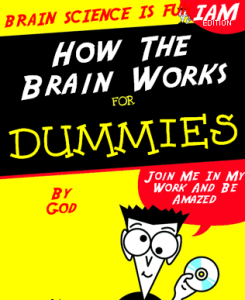Stand Up! Make It Personal. Part 4
Is There An Addiction Brain?
If we trace the path of addiction research, sift through the volumes of published reports and opinions from science, medicine, justice, and education; then add the evolutionary (certainly not revolutionary) development of treatment, we find the one question that when answered, can place us on the path to resolving the addiction challenge:
Is there a brain system impairment that leads people to substance abuse and addiction?
To answer that question, we have to stop straddling research and treatment – science and God – and go beneath the water line to take on the issues that challenge the addiction industry party line. (see part 3)
And this is the point. If we are going to use and learn from science, we must trust the data and accept what it says; not interpret it to fit an existing narrative, or pick and choose what pieces we wish to believe and report.
Likewise, if we are going to profess faith and trust in God, we must accept all of Him; last I checked God doesn’t come as an a’ la carte menu for us to pick and choose the parts that feel good and are deemed acceptable by the general public.
And most importantly, if we are going to resolve the addiction challenge, we must place our focus squarely on saving lives, not reputations. We must explore the brain and its functioning as best the emerging technology allows. And we must look at the data from the perspective of God who created each unique brain and ask, for what good purpose might He have created it this way?
Bottom line, we can’t choose between following God and Science. God invited us to reason with Him, to argue our case together, to join Him in His work.
Some argue that the Bible tells people not to use or trust science. But that’s ridiculous, as science is how we explore and appreciate the wonderful things God gave us. Revealing how things work is one of the ways He amazes us.
What God says is that we are not to depend just on our own knowledge and understanding, as that opens the door to insert personal bias and influence findings, not to mention the whole pride thing. Instead, we are to acknowledge and include Him in our work just as we are invited into His, so we can begin to see through His eyes and understand better how he made things and why. I believe that also helps us discern when something He created might not be working properly and is in need of repair.
Note: Because God created everything, He knows how everything works. And for that reason, I like to think of Him as the chief engineer of all things. Back in the days that I worked in design and manufacturing businesses, we would partner with the engineers who brought new product ideas to life. They were the ones who designed and developed the product. They defined every part, determining how each would be made and how it would fit into the whole. For the finished product and its components they specified tolerances and allowances to ensure everything fit and operated as intended under a range of conditions. I remember one product in particular that we were concerned might be a problem because a removable part responsible for its movement could get lost or damaged. The engineer had anticipated that too, and had introduced a back-up mechanism that would allow the product to perform even without the part. When there was any complaint about a product’s operation, we went directly to the engineer who designed it, who could advise if something actually was wrong, whether it was being used improperly, or was in need of maintenance work and other attention. In fact when we had such an issue, we would go to great lengths to avoid consulting with an alternate engineer, as he or she had not been involved with the design process and so didn’t know why things were done as they were or how they were supposed to work. Consequently, he or she would almost certainly see the complaint as reflecting a design flaw requiring product modifications that could alter the product from what was intended, without taking into account possible down-road implications for overall product integrity.
That One Big Question
So that leaves the billion dollar question: Among people the 20% or so of the population that transmits relatively lower volumes of NT in response to a stimulus and as a result does not experience a satisfying reward, what’s next for them? Is it as we’ve been taught for decades that the lower NT levels reflect an impaired reward system that will lead them to use drugs and alcohol? Nope.
For what possible reason would God give about a fifth of His children brains uniquely designed to lead them to drugs and alcohol? He wouldn’t, and He didn’t. Every person’s brain is uniquely designed for good purpose. If you aren’t ready to accept the idea of God’s deliberate design of all things including our brains because it can’t be proved objectively, know that the existing position of an impaired reward system leading to substance use, cannot be supported with objective evidence either, but it can be objectively contradicted[i].
If you choose to hold onto the existing premise because you question the role of faith in science, know that the view you selected is based wholly on faith – faith in the people searching for something wrong with the brains of addicted people. They found something different and labeled it an impairment.
And The Follow-Up Question
Let’s return now to the basic question, when people don’t feel the satisfying reward they need what can we expect?
 The one effect is that they are motivated to do more. To reach farther, go faster, work harder, dig deeper, climb higher, to go beyond average or the norm. It’s for them that we have expressions like pushing the envelope, nine dot square planning, thinking outside the box, breaking barriers, shattering glass ceilings, going the extra mile and such.
The one effect is that they are motivated to do more. To reach farther, go faster, work harder, dig deeper, climb higher, to go beyond average or the norm. It’s for them that we have expressions like pushing the envelope, nine dot square planning, thinking outside the box, breaking barriers, shattering glass ceilings, going the extra mile and such.
Do some choose substances as their more extreme form of stimulus, and with repeated use, become addicted? Absolutely. And others, with similar low NT responses, chose highly productive and rewarding extremes.
Whether or not they seek a more intense form of behavior isn’t the question. They will. The issue is which behavior(s) or interest(s) they ultimately choose.
The fields of learning and decision-making sciences are exploding with new insight to help us understand this better. The research paints an amazing picture of the confluence of neural communication and individual character in the brain’s decision-making center, influencing the choices and decisions that shape a person’s life.
As you are reading this, consider all you are sensing from your surroundings, maybe the aroma of coffee brewing, the sound of rain on the roof, the softness of the sofa cushion molding to your body, the purring of your cat next to you and the cool wetness of his nose as he nudges you to pet him, then the sound of an alert from your phone reminding you of a meeting that you’d like to skip but made a commitment to attend.
Now imagine this and so much more input, translated into countless electrochemical transmissions being conducted at incredible velocities  along vast neural networks as they carry messages to, from and across multiple brain regions, representing an intricate supply chain network to the brain’s executive region, providing all of this sensory, emotional, objective and subjective information to your decision making center, where your faith, character, and overall individuality also reside and serve as arbitrator in our reasoning, judgments and decisions.
along vast neural networks as they carry messages to, from and across multiple brain regions, representing an intricate supply chain network to the brain’s executive region, providing all of this sensory, emotional, objective and subjective information to your decision making center, where your faith, character, and overall individuality also reside and serve as arbitrator in our reasoning, judgments and decisions.
Even in such simple situations as how you respond to your schedule reminder, whether you just settle into your cozy spot on the couch, go to the kitchen to pour a fresh cup of coffee and return to the cat on the sofa, leave the room and prepare for the meeting, or any number of possible choices, are influenced in this manner.
Some will argue that people’s thinking and behavior are just about brain impulses and reactions. But if our brains were in charge and our thoughts and behaviors were merely the output of the brain’s complex neural activity, a person’s character would be little more than a pre-set neural switching station directing data in the decision making process. Individuality would be boiled down to the equivalent of a model number identifying a “type” of person and behavior.
But that would deny what we know about how people develop, learn and change their character as defined by their faith, beliefs, values, morals, personality and interests. And it would ignore what’s been learned about the influence of character on judgment and behavior as well as the reverse holding true.
And it makes us ask, for what possible reason would God give us this remarkable brain with its wide-open capabilities and (seemingly) infinite capacity to experience, learn, grow and change, if His plan were to lock us on autopilot to execute a lifetime sequence of programmed commands? Why would He give us free will and equip us with everything needed to exercise it as we choose, and then not give us the choice? The short answer to both questions is that He wouldn’t, and the science confirms that He didn’t.
It would be great to find the definitive and detailed description of everything God intended for us and our brains. But seeing as that’s not likely to show up on our doorsteps anytime soon, we already have valuable information and insight to guide us, if we are willing to accept what the uncensored research data and God’s word tell us.
Looking at all we know from the perspective the One who created us, the likely reason for His giving a good share of His children brains that encourage them to seek more, becomes self-evident.
Just look for yourselves and see how their driven brains equip each of them for exceeding expectations, for continuing when others stop, for running into burning buildings to save people as others rush out, for working harder and playing harder, and never being satisfied with just Okay.
 As you look at God’s frontline soldiers and see how their added drive is critical to their service, you’ll realize they were never intended to be average – to fit in with the norm.
As you look at God’s frontline soldiers and see how their added drive is critical to their service, you’ll realize they were never intended to be average – to fit in with the norm.
What’s so special about “normal” anyway? When was the last time you thought, boy if I’m ever in need of rescue, I sure hope some average guy is around to save me. Or one day should you advance to the finals in a relay competition, would you wish for your teammates to be really ordinary? Being normal is a very good thing in many areas of life, but without the driven people to break down barriers, exceed limits and stretch horizons, our society wouldn’t move forward and new norms wouldn’t be set.
That said, how people direct their driven nature matters, and that comes down to character.
Developing our individual character including our faith, values, morals, personality and interests, takes on new importance when we see its role in influencing how we sort, prioritize, and respond to the flood of input from today’s chaotic environment. And when we consider those people with brains that run best on “extreme” stimuli, and know that whatever they choose – whether productive or destructive – will be “more,” the quality of their character becomes paramount.
With strong character built on God’s teachings, these driven individuals are equipped for very good things.
But what about those who yielded to temptation, make destructive choices and become lost in addiction?
What about God’s promised “exit,” or way out, for those who give in to the enticements surrounding them? Goodness knows, there are plenty of alluring things out there.
Well, this happens to be what I think is the absolute coolest part of God’s design and of the new technology that’s revealing more about the brain’s unimagined capabilities every day. His “exit plan” is designed into our brain’s ability to change!
 No matter how bad our decisions, how far off the path we’ve drifted, or how old we’ve grown, we can choose to change our character and who we are.
No matter how bad our decisions, how far off the path we’ve drifted, or how old we’ve grown, we can choose to change our character and who we are.
The expanding fields of learning, gaming and decision-making science teach us that people develop their personal character and individuality. They are not born with it. It does not happen spontaneously. And in the same way that people develop their individuality once, they can choose to change and develop it all over again, to become something and someone different[ii].
And with each change they choose, and each new thing learned, so their brain changes, forming new cells and connections. And when repeatedly reinforced with corresponding choices and behaviors, it becomes part of who they’ve determined to be.
Even the extremely destructive addiction behaviors can be replaced with extremely rewarding productive behaviors. When the replacement behaviors are in alignment with the person’s new individuality – their faith and character – and when, through repeated experiential and rational learning, the new behaviors become their natural responses and choices, the driven person should find that no longer must try to manage their addiction symptoms. They can be free of addiction.
It’s a good exit plan. The Stand was developed to help people implement it.
You might be wondering, if all of this is true, why haven’t we heard about it? Why aren’t families standing up and demanding that the addiction industry abandon its outdated premise and ineffective practices and embrace this or some similar direction?
And that’s when it hit me. I n all of our well-meaning efforts to keep the discussion about addiction all business-like and professional, never letting it get personal so not to offend or discourage anyone, we effectively sanitized a very messy and distasteful situation into something we could feel comfortable talking about.
n all of our well-meaning efforts to keep the discussion about addiction all business-like and professional, never letting it get personal so not to offend or discourage anyone, we effectively sanitized a very messy and distasteful situation into something we could feel comfortable talking about.
And as we who explore matters of addiction, from within and outside the industry, discussed the latest cutting edge technology, the meaning of vivid brain imaging pictures, and topics to address at the next addiction summit, we somehow lost sight of the fact this whole addiction challenge isn’t about business, its about people. And they are dying.
 Especially when the ones who are suffering, and those we’ve already lost, are close to us, everything changes and it suddenly gets very personal. And it’s at that point that we realize we must stand up for them, and for their right to live. When it gets really personal, we finally are ready to be uncomfortable, to get our hands dirty, and to find the courage to stand up for the truth, no matter the insults, curses or ridicule thrown at you.
Especially when the ones who are suffering, and those we’ve already lost, are close to us, everything changes and it suddenly gets very personal. And it’s at that point that we realize we must stand up for them, and for their right to live. When it gets really personal, we finally are ready to be uncomfortable, to get our hands dirty, and to find the courage to stand up for the truth, no matter the insults, curses or ridicule thrown at you.
The simple fact is, if we want to turn the tide on addiction, if we are ready for the hard work of implementing the exit plan God is revealing to free people from addiction, we’re going to have to make a lot of people uncomfortable, make it extremely personal, and Stand.
“But when you are tempted, He will also provide a way out… ” 1 Corinthians 10:13
I will be introducing the key points of the exit plan, The Stand, shortly.
[i] Reference Brain Science, What Like It’s Hard? Parts 1 and 2
[ii] http://www.psychologytoday.com/blog/the-athletes-way/201305/neuroscientists-discover-keys-individual-personality

